-
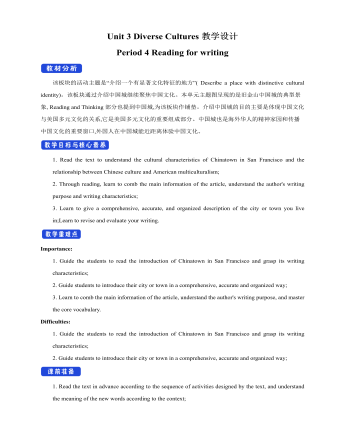
新人教版高中英语必修3Unit 3 Diverse Cultures教学设计四
该板块的活动主题是“介绍一个有显著文化特征的地方”( Describe a place with distinctive cultural identity)。该板块通过介绍中国城继续聚焦中国文化。本单元主题图呈现的是旧金山中国城的典型景象, Reading and Thinking部分也提到中国城,为该板块作铺垫。介绍中国城的目的主要是体现中国文化与美国多元文化的关系,它是美国多元文化的重要组成部分。中国城也是海外华人的精神家园和传播中国文化的重要窗口,外国人在中国城能近距离体验中国文化。1. Read the text to understand the cultural characteristics of Chinatown in San Francisco and the relationship between Chinese culture and American multiculturalism;2. Through reading, learn to comb the main information of the article, understand the author's writing purpose and writing characteristics;3. Learn to give a comprehensive, accurate, and organized description of the city or town you live in;Learn to revise and evaluate your writing.Importance:1. Guide the students to read the introduction of Chinatown in San Francisco and grasp its writing characteristics;2. Guide students to introduce their city or town in a comprehensive, accurate and organized way;3. Learn to comb the main information of the article, understand the author's writing purpose, and master the core vocabulary.
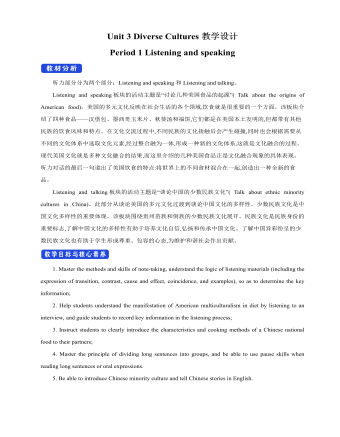
新人教版高中英语必修3Unit 3 Diverse Cultures教学设计一
Activity 81.Grasp the main idea of the listening.Listen to the tape and answer the following questions:Who are the two speakers in the listening? What is their relationship?What is the main idea of the first part of the listening? How about the second part?2.Complete the passage.Ask the students to quickly review the summaries of the two listening materials in activity 2. Then play the recording for the second time.Ask them to complete the passage and fill in the blanks.3.Play the recording again and ask the students to use the structure diagram to comb the information structure in the listening.(While listening, take notes. Capture key information quickly and accurately.)Step 8 Talking Activity 91.Focus on the listening text.Listen to the students and listen to the tape. Let them understand the attitudes of Wu Yue and Justin in the conversation.How does Wu Yue feel about Chinese minority cultures?What does Justin think of the Miao and Dong cultures?How do you know that?2.learn functional items that express concerns.Ask students to focus on the expressions listed in activity. 3.And try to analyze the meaning they convey, including praise (Super!).Agree (Exactly!)"(You're kidding.!)Tell me more about it. Tell me more about it.For example, "Yeah Sure." "Definitely!" "Certainly!" "No kidding!" "No wonder!" and so on.4.Ask the students to have conversations in small groups, acting as Jsim and his friends.Justin shares his travels in Guizhou with friends and his thoughts;Justin's friends should give appropriate feedback, express their interest in relevant information, and ask for information when necessary.In order to enrich the dialogue, teachers can expand and supplement the introduction of Miao, dong, Lusheng and Dong Dage.After the group practice, the teacher can choose several groups of students to show, and let the rest of the students listen carefully, after listening to the best performance of the group, and give at least two reasons.
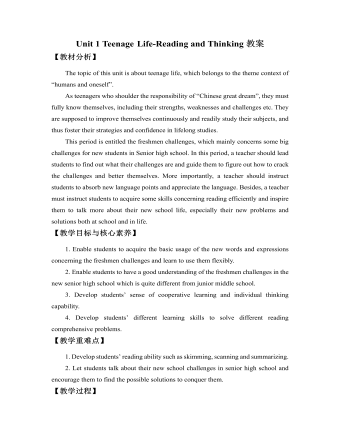
新人教版高中英语必修1Unit 1 Teenage Life-Reading and Thinking教案
【教材分析】The topic of this unit is about teenage life, which belongs to the theme context of “humans and oneself”.As teenagers who shoulder the responsibility of “Chinese great dream”, they must fully know themselves, including their strengths, weaknesses and challenges etc. They are supposed to improve themselves continuously and readily study their subjects, and thus foster their strategies and confidence in lifelong studies.This period is entitled the freshmen challenges, which mainly concerns some big challenges for new students in Senior high school. In this period, a teacher should lead students to find out what their challenges are and guide them to figure out how to crack the challenges and better themselves. More importantly, a teacher should instruct students to absorb new language points and appreciate the language. Besides, a teacher must instruct students to acquire some skills concerning reading efficiently and inspire them to talk more about their new school life, especially their new problems and solutions both at school and in life.【教学目标与核心素养】1. Enable students to acquire the basic usage of the new words and expressions concerning the freshmen challenges and learn to use them flexibly.2. Enable students to have a good understanding of the freshmen challenges in the new senior high school which is quite different from junior middle school.3. Develop students’ sense of cooperative learning and individual thinking capability. 4. Develop students’ different learning skills to solve different reading comprehensive problems.
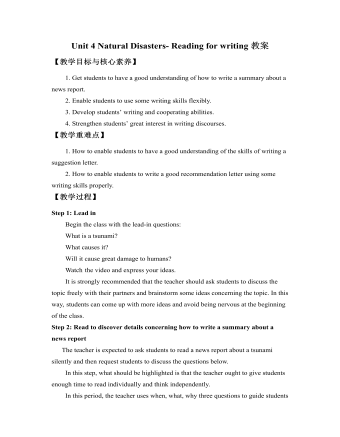
新人教版高中英语必修1Unit 4 Natural Disasters- Reading for writing教案
①标题——标题应当简洁明了。②导语——导语是消息开头的第一段或第一句话,简明扼要地揭示出消息的核心内容。③主体——主体是消息的主要部分,要用充足的事实表现主题,对导语的内容作进一步的展开和阐述。④结束语——通常是对全文内容进行概括性的总结。3. 新闻报道增分句子(1)陈述事实常用的句型:①A terrible storm hit/struck ... , killing ..②It was a cool autumn night when the earthquake happened. A large number of buildings fell down and roads were destroyed, leaving a great many people homeless.地震发生在一个凉爽的秋夜。大量的建筑物倒塌,道路被毁,许多人无家可归。③With the help of the rescue team, people who were the trapped in the flood were saved.在救援队的帮助下,困在洪水中的人们得救了。(2)陈述观点常用的句型:①Clearly/Obviously/In my opinion/It seemed that people were shocked.显然/在我看来/似乎人们震惊了。②The whole city was in ruins after the earthquake.地震后整个城市成了一片废墟。(3)揭示原因常用的句型:Because of/As a result of/Thanks to the help of the army, people who got injured were sent to the hospital immediately.
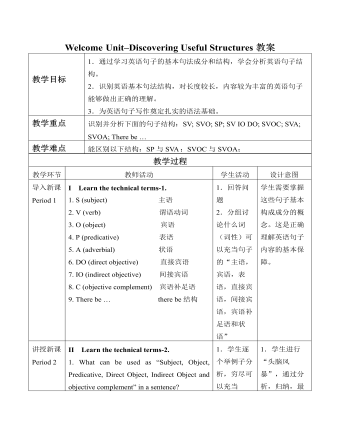
新人教版高中英语必修1Welcome Unit-Discovering Useful Structures教案
II Learn the technical terms-2.1. What can be used as “Subject, Object, Predicative, Direct Object, Indirect Object and objective complement” in a sentence?2. What can be used as “adverbial” in a sentence?3. What can be used as “verb” in a sentence?Answers to questions 1-3:1. Nouns, pronouns and appellations can be used as “Subject, Object, Predicative, Direct Object, Indirect Object and Objective Complement”. Besides, adjectives can be used as “Predicative and Objective Complement” in a sentence.2. Adverbs and prepositional phrases can be used as “Adverbial”.3. Verbs with actual meaning can be used as “Verb” in a sentence. Auxiliary verbs alone cannot be used as “Verb” in a sentence.III Learn to recognize the sentence structures.1. SV structure. For Example:(1) A bird flies.S V(2) A monkey jumps.S V(3) A fish swims.S V√ In SV structures, verbs are “intransitive verbs”.2. SVO structure. For Example:(1) A sheep eats grass.S V O(2) They like bananas.S V O(3) He wants candy.S V O√ In SVO structures, verbs are “transitive verbs”.3. SP structure. For Example:(1) This is great.S P (2) He looks well.S P (3) She became a teacher.S P √ In SP structures, Predicatives are formed by “link verbs” and “adjectives or nouns”.√ link verbs: be, become, grow, look, feel, taste, etc.4. SV IO DO structure. For Example:(1) He asked me a question.S V IO DO(2) Danny wrote me a letter.S V IO DO(3) Billy brought Sam a kite.S V IO DO√ In SV IO DO structures, the verbs are transitive and are followed by two objectives – pronouns or nouns as Indirect Objective, and nouns as Direct Objectives.
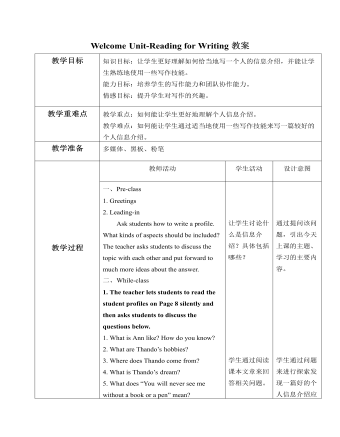
新人教版高中英语必修1Welcome Unit-Reading for Writing教案
教学目标知识目标:让学生更好理解如何恰当地写一个人的信息介绍,并能让学生熟练地使用一些写作技能。能力目标:培养学生的写作能力和团队协作能力。情感目标:提升学生对写作的兴趣。教学重难点 教学重点:如何能让学生更好地理解个人信息介绍。教学难点:如何能让学生通过适当地使用一些写作技能来写一篇较好的个人信息介绍。教学准备 多媒体、黑板、粉笔一、Pre-class1. Greetings2. Leading-inAsk students how to write a profile. What kinds of aspects should be included? The teacher asks students to discuss the topic with each other and put forward to much more ideas about the answer.二、While-class1. The teacher lets students to read the student profiles on Page 8 silently and then asks students to discuss the questions below.1. What is Ann like? How do you know?2. What are Thando’s hobbies?3. Where does Thando come from?4. What is Thando’s dream?5. What does “You will never see me without a book or a pen” mean?
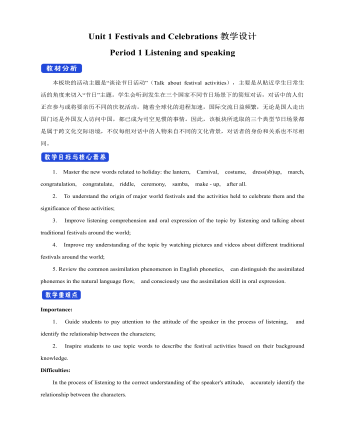
新人教版高中英语必修3Unit 1 Festivals and Celebrations教学设计一
本板块的活动主题是“谈论节日活动”(Talk about festival activities),主要是从贴近学生日常生活的角度来切入“节日”主题。学生会听到发生在三个国家不同节日场景下的简短对话,对话中的人们正在参与或将要亲历不同的庆祝活动。随着全球化的进程加速,国际交流日益频繁,无论是国人走出国门还是外国友人访问中国,都已成为司空见惯的事情。因此,该板块所选取的三个典型节日场景都是属于跨文化交际语境,不仅每组对话中的人物来自不同的文化背景,对话者的身份和关系也不尽相同。1. Master the new words related to holiday: the lantern, Carnival, costume, dress(sb)up, march, congratulation, congratulate, riddle, ceremony, samba, make - up, after all. 2. To understand the origin of major world festivals and the activities held to celebrate them and the significance of these activities;3. Improve listening comprehension and oral expression of the topic by listening and talking about traditional festivals around the world;4. Improve my understanding of the topic by watching pictures and videos about different traditional festivals around the world;5. Review the common assimilation phenomenon in English phonetics, can distinguish the assimilated phonemes in the natural language flow, and consciously use the assimilation skill in oral expression. Importance:1. Guide students to pay attention to the attitude of the speaker in the process of listening, and identify the relationship between the characters;2. Inspire students to use topic words to describe the festival activities based on their background knowledge. Difficulties:In the process of listening to the correct understanding of the speaker's attitude, accurately identify the relationship between the characters.
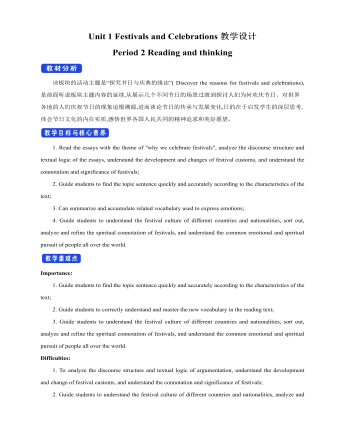
新人教版高中英语必修3Unit 1 Festivals and Celebrations教学设计三
*wide range of origins(= a great number of different origins, many kinds of origins)*It featured a parade and a great feast with music, dancing, and sports. (=A parade and a great feast with music, dancing, and sports were included as important parts of the Egyptian harvest festival.)*.. some traditions may fade away and others may be established.(= Some traditions may disappear gradually, while other new traditions may come into being.)Step 6 Practice(1) Listen and follow the tape.The teacher may remind the students to pay attention to the meaning and usage of the black words in the context, so as to prepare for the completion of the blanks in activity 5 and vocabulary exercises in the exercise book.(2) Students complete the text of activity 5 by themselves.The teacher needs to remind the students to fill in the blanks with the correct form of the vocabulary they have learned in the text.Students exchange their answers with their partners, and then teachers and students check their answers.(3)Finish the Ex in Activity 5 of students’ book.Step 7 Homework1. Read the text again, in-depth understanding of the text;2. Discuss the origin of festivals, the historical changes of related customs, the influence of commercial society on festivals and the connotation and essential meaning of festivals.3. Complete relevant exercises in the guide plan.1、通过本节内容学习,学生是否理解和掌握阅读文本中的新词汇的意义与用法;2、通过本节内容学习,学生能否结合文本特点快速而准确地找到主题句;3、通过本节内容学习,学生能否理清论说文的语篇结构和文本逻辑,了解节日风俗发展与变迁,感悟节日的内涵与意义。
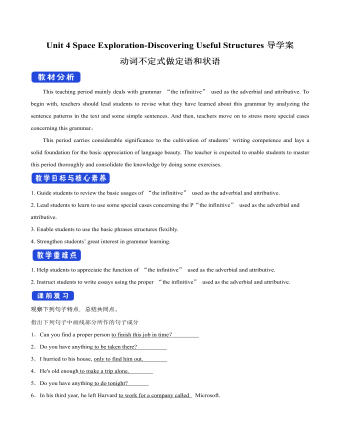
新人教版高中英语必修3Unit 4 Space Exploration-Discovering Useful Structures导学案
【点津】 1.不定式的复合结构作目的状语 ,当不定式或不定式短语有自己的执行者时,要用不定式的复合结构?即在不定式或不定式短语之前加 for +名词或宾格代词?作状语。He opened the door for the children to come in. 他开门让孩子们进来。目的状语从句与不定式的转换 英语中的目的状语从句,还可以变为不定式或不定式短语作状语,从而使句子在结构上得以简化。可分为两种情况: 1?当目的状语从句中的主语与主句中的主语相同时,可以直接简化为不定式或不定式短语作状语。We'll start early in order that/so that we may arrive in time. →We'll start early in order to/so as to arrive in time. 2?当目的状语从句中的主语与主句中的主语不相同时,要用动词不定式的复合结构作状语。I came early in order that you might read my report before the meeting. →I came early in order for you to read my report before the meeting.
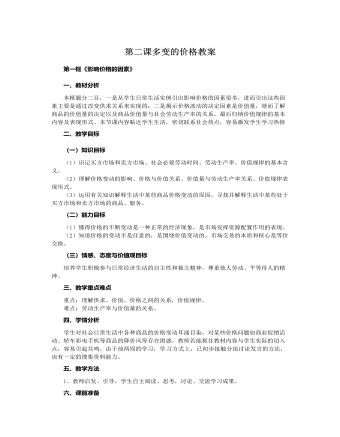
人教版高中政治必修1第二课多变的价格教案
(四)反思总结,当堂检测。本节内容讲述了价格变动对人们生活、生产的影响作用,主要知识框架如下:(1)、价格变动会影响人们的消费需求,商品价格上涨,人需求就减少,反之,则增大。价格变动对不同商品需求影响程度是不一样的,对生活必需品的需求量影响较小,对高档耐用品的需求量影响较大。相关商品价格变动对消费需求的影响不同,某种商品价格上涨,就会减少需求量,其替代品需求量增加,其互补品需求量则减少。(2)、价格变化也会影响生产经营,价格变动会调节生产,刺激生产者改进技术,提高劳动生产率,促使生产者生产适销对路的高 质量产品。(五)发导学案、布置预习。预习第三课第一框《消费及其类型》,完成预习导学案练习题九、板书设计《价格变动的影响》1、对人们生活的影响(1)商品价格变动与消费需求量之间的关系(2)不同商品的需求量对价格变动的反应程度不同
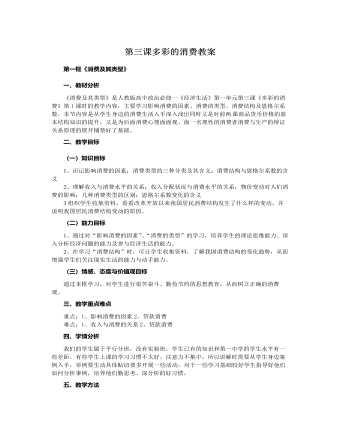
人教版高中政治必修1第三课多彩的消费教案
二、做理智的消费者1、量入为出,适度消费2、避免盲从,理性消费3、保护环境,绿色消费4、勤俭节约,艰苦奋斗十、教学反思本课的设计采用了课前下发预习学案,学生预习本节内容,找出自己迷惑的地方。课堂上师生主要解决重点、难点、疑点、考点、探究点以及学生学习过程中易忘、易混点等,最后进行当堂检测,课后进行延伸拓展,以达到提高课堂效率的目的。这节课我们主要学习了影响人们消费的几种消费心理和几种科学的消费观。本节课与学生生活十分贴近所以这节课充分的调动了学生学习的兴趣和积极性,并且让学生针对案例进行充分的分组讨论分析,通过学生的展示分析和补充可以知道学生们不但深层次分析了教学原理也透彻理解了教学重难点大大提高了课堂效率.。通过案例的分析进一步领会了教材原理突破了本节课的难点——树立正确的消费观。整堂课学生求知旺盛,复杂的知识变得简单化,从阅读教材到独立思考分析再到合作讨论最后的展示质疑答疑,加深了印象,提高了能力。
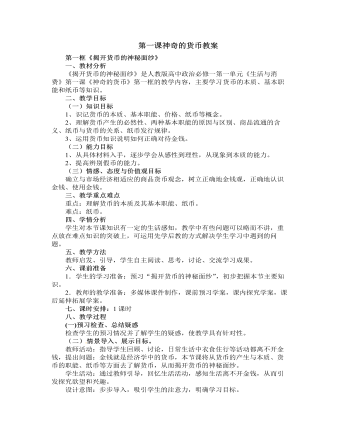
人教版高中政治必修1第一课神奇的货币教案
1、外汇与外币的关系:(1)外汇包括外币,但外汇不等于就是外币。外币是指外国的货币,包括外国的纸币、铸币;外汇通常是以外国货币表示的用于国际间结算的支付手段,具体包括外币、外币有价证券、外币支付凭证等。(2)外币属于外汇的范围,但不能把二者等同起来。通常情况下,只有可以自由兑换的外币才是外汇,因为外汇的实质是国际支付手段,如果某种货币不能自由兑换,它就不能成为国际支付手段。外汇执行的 主要是货币的支付手段的职能。(3)持有外汇意味着对外汇发行国拥有债权。持有外汇过多,一方面意味着国际支付能力强和有可能对外汇发行国施加影响;另一方面则意味着大量该由本国享受的资源,被借给外国利用,并要承担外汇贬值的风险。2、关于币值变化的分析:(1)对货币升值的具体分析:一个国家的货币升值(上浮)后,同量的这种货币能比以前换 取更多的他国货币,买到更多的他国商品。
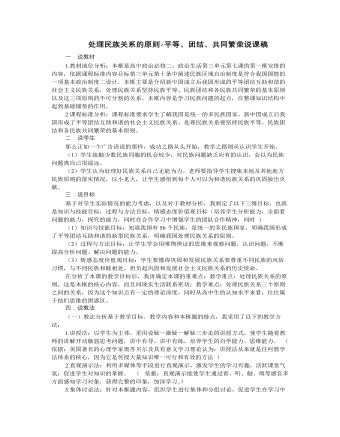
人教版高中政治必修2处理民族关系的原则-平等、团结、共同繁荣说课稿
环节四 情感升华,感悟生活播放《爱我中华》,感受祖国的伟大,民族的团结。设计意图:使学生感受伟大的中华民族的精神,内心产生共鸣,抒发强烈的爱国热情。教师带领学生一起合唱,用歌声结束本堂课内容,能再次唤起学生的爱国情感,使学生认识到:维护国家统一和民族团结是每个公民的义务。环节五 课堂小结 巩固知识本节课我采用线索性的板书,整个知识结构一目了然,为了充分发挥学生在课堂的主体地位,我将课堂小结交由学生完成,请学生根据课堂学习的内容,结合我的板书设计来进行小结,以此来帮助教师在第一时间掌握学生学习信息的反馈,同时培养学生归纳分析能力、概括能力。本节课,我根据建构主义理论,强调学生是学习的中心,学生是知识意义的主动建构者,是信息加工的主体,要强调学生在课堂中的参与性、以及探究性,不仅让他们懂得知识,更让他们相信知识,并且将知识融入到实践当中去,最终达到知、情、意、行的统一。
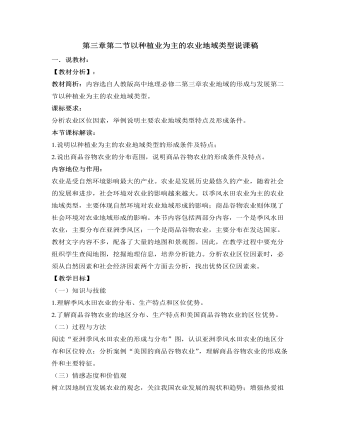
人教版高中地理必修2第三章第二节以种植业为主的农业地域类型说课稿
本节课标解读:1.说明以种植业为主的农业地域类型的形成条件及特点;2.说出商品谷物农业的分布范围,说明商品谷物农业的形成条件及特点。内容地位与作用:农业是受自然环境影响最大的产业。农业是发展历史最悠久的产业,随着社会的发展和进步,社会环境对农业的影响越来越大。以季风水田农业为主的农业地域类型,主要体现自然环境对农业地域形成的影响;商品谷物农业则体现了社会环境对农业地域形成的影响。本节内容包括两部分内容,一个是季风水田农业,主要分布在亚洲季风区;一个是商品谷物农业,主要分布在发达国家。教材文字内容不多,配备了大量的地图和景观图。因此,在教学过程中要充分组织学生查阅地图,挖掘地理信息,培养分析能力。分析农业区位因素时,必须从自然因素和社会经济因素两个方面去分析,找出优势区位因素来。
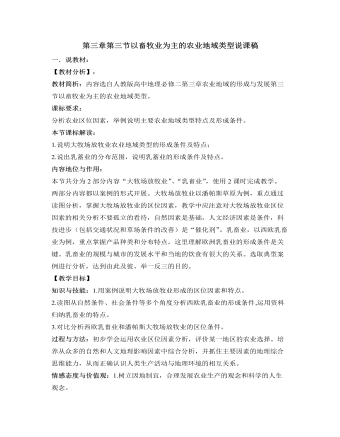
人教版高中地理必修2第三章第三节以畜牧业为主的农业地域类型说课稿
1.导入新课:通过视频“阿根廷的潘帕斯草原”,引起学生的兴趣,进而引出新的学习内容——以畜牧业为主的农业地域类型。2.新课讲授:第一课时,首先通过展示“世界大牧场放牧业分布图”,引出对大牧场放牧业的初步认识,了解其分布范围;然后通过展示“潘帕斯草原的地形图”“气候图”和“牧牛业景观图”,讨论分析大牧场放牧业形成的区位条件,并进行案例分析,学习该种农业的特点;最后,理论联系实际,展示:“中国地形图”“气候图”“人口图”“交通图”和“内蒙古牧区图”,分组讨论我国内蒙古地区能否采用潘帕斯草原大牧场放牧业的生产模式。第二课时,首先通过设问顺利从大牧场放牧业转入乳蓄业,通过讲述让学生了解乳蓄业的概念;然后通过展示世界乳畜业分布图,了解乳蓄业主要分布在哪些地区;接着,通过西欧乳蓄业的案例分析,得到乳蓄业发展的区位因素及其特点。
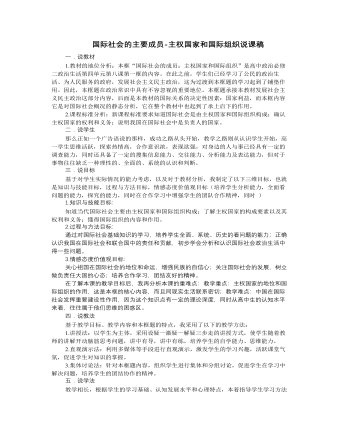
人教版高中政治必修2国际社会的主要成员-主权国家和国际组织说课稿
【教师总结:联合国的会徽的世界地图象征着联合国是一个世界性的国际组织;图案中得橄榄枝象征着和平。联合国采取了很多措施以实现它的宗旨,如对于朝鲜违反国际法规进行核试验,联合国给予警告和制裁,充分体现了它维护国际和平与安全,促进国际合作与发展的宗旨。】对于中国与联合国的关系这部分内容,我将请阅读教材92页几幅图片及材料内容,设置活动探究课中国在联合国的声音和身影,请合作讨论思考以下两个问题,中国与联合国的关系;列举事实说明中国在国际社会中的重要作用。 教师通过剖析中国在联合国的地位和作用,引导学生理解中国在国际社会中发挥着重要作用,是负责任的国家;同时培养学生综合运用知识分析说明问题的能力,使学生感受作为中国人的自豪。【教师总结:中国是联合国的创始国之一,中国作为联合国的创始国和安理会常任理事国之一,一贯遵循联合国宪章的宗旨和原则,积极参与联合国及其专门机构有利于世界和平和发展的活动。】
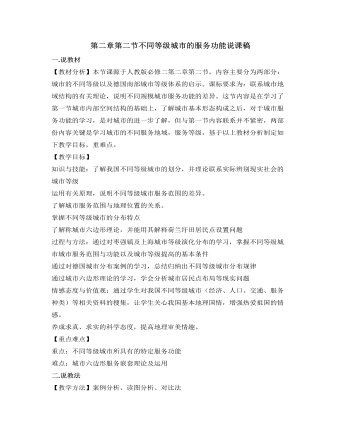
人教版高中地理必修2第二章第二节不同等级城市的服务功能说课稿
【教学目标】知识与技能:了解我国不同等级城市的划分,并理论联系实际辨别现实社会的城市等级运用有关原理,说明不同等级城市服务范围的差异。了解城市服务范围与地理位置的关系。掌握不同等级城市的分布特点了解称城市六边形理论,并能用其解释荷兰圩田居民点设置问题过程与方法:通过对枣强镇及上海城市等级演化分布的学习,掌握不同等级城市城市服务范围与功能以及城市等级提高的基本条件通过对德国城市分布案例的学习,总结归纳出不同等级城市分布规律通过城市六边形理论的学习,学会分析城市居民点布局等现实问题情感态度与价值观:通过学生对我国不同等级城市(经济、人口、交通、服务种类)等相关资料的搜集,让学生关心我国基本地理国情,增强热爱祖国的情感。养成求真、求实的科学态度,提高地理审美情趣。
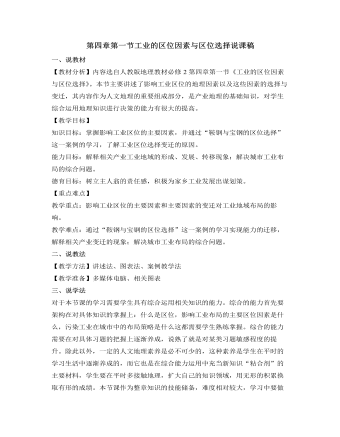
人教版高中地理必修2第四章第一节工业的区位因素与区位选择说课稿
在这段教学中可以插入世界主要铁矿、煤矿,以及我国主要的矿产基地、钢铁生产基地的相关内容,不失为区域地理知识的很好补充和巩固。那么从现状来看我国的钢铁产业基地多数污染较为严重,可见工业区位的选择同样要顾及到环境的因素,由此引入下一部分的内容。除了传统意义上的工业区位因素外,环境、政策以及决策者的理念和心理等日益受到人们的关注。在这段文字的处理上,只需进行概念、道理上的陈述即可,重点要放在污染工业在城市中的布局这一知识点上。首先要了解什么工业会造成怎样的污染,然后根据污染的类别分别讲解不同的应对方略,最后将配以适当的例题以期提高学生的整体把握程度和综合运用能力。最后将对本节内容进行小结,要在小结中阐述清楚本节课的两大内容:即工业的区位因素和工业区位的选择。然后点明本节课的主要知识点、难点、重点。在时间允许的情况下可以适当安排几道有关主导产业和城市工业布局的例题加以练习。
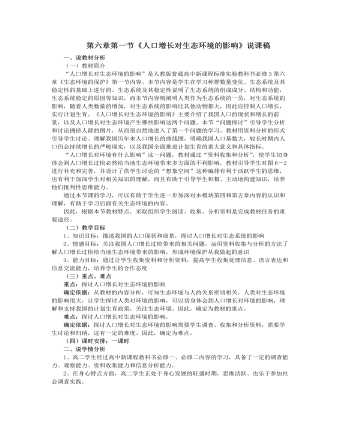
人教版高中生物必修3第六章第一节《人口增长对生态环境的影响》说课稿
3、讨论问题二:我国、我市人口增长对环境有那些影响?教师:让第三、第四组学生分别介绍、展示课前调查到的资料,说明人口增长对我国环境的影响、对三亚市环境的影响。学生:第三组学生派代表介绍人口增长过快对我国生态环境的影响。第四小组由学生自己主持“我市人口增长过快对三亚市生态环境的影响”讨论会,汇报课前调查到的资料和讨论,其它小组参与发言。教师:投影:课本图6-2组织学生讨论、补充和完善。学生:观察老师投影图片并进行讨论,对图片问题进行补充和完善。教学意图:通过让学生汇报、观察、主持,能让学生亲身体验,更深刻地理解人口增长对生态环境的影响,培养和提高学生的表达能力、观察能力、主持会议的能力。4、讨论问题三:怎样协调人与环境的关系?教师:组织第五组学生进行汇报课前调查到的资料,交流、讨论、发表意见和见解。学生:展示课件、图片,汇报调查到的情况,提出合理建议。
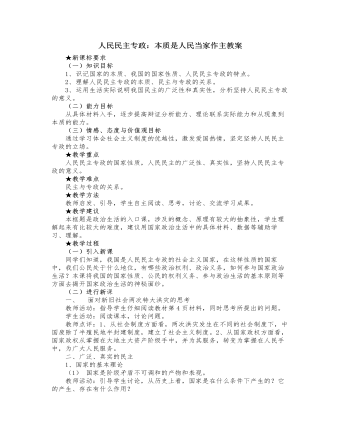
人教版高中政治必修2人民民主专政:本质是人民当家作主教案
三、坚持人民民主专政教师活动:请同学们阅读教材P7页,思考下列问题:为什么要坚持人民民主专政?现阶段如何坚持人民民主专政?学生活动:阅读课本,找出问题。1、坚持人民民主专政的重要性(1)坚持人民民主专政是四项基本原则之一,是我国的立国之本。(2)坚持人民民主专政是现代化建设的政治保证。坚持人民民主,才能调动人民现代化建设的积极性;坚持对敌对势力的专政,才能保障人民民主,维护国家安定。2、坚持人民民主专政的新的时代内容突出经济建设服务职能;为改革开放和现代化建设创造良好国内外环境;重视法制建设,依法治国;发展人民民主,加强民主制度建设。(三)课堂总结、点评本节内容讲述了我国的国家性质的有关知识,懂得我国是人民民主专政的社会主义国家,其本质是人民当家作主,我国的人民民主具有广泛性和真实性,是真正的大多数人的统治,必须坚持人民民主专政。





















